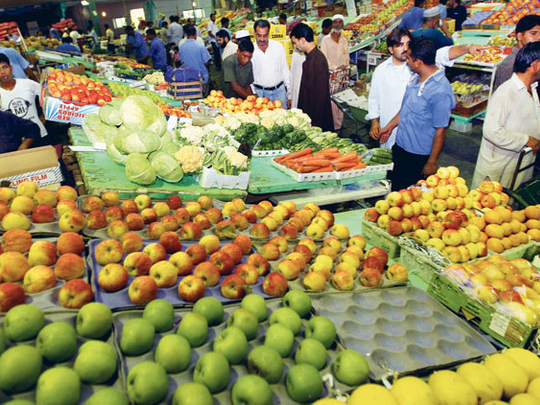
Dubai: The prices of certain types of vegetables have rocketed following an import ban when some produce was found to contain unacceptable levels of insecticide, according to local supermarkets.
Greens like parsley, rocca, coriander, and mint have either disappeared from stores or become expensive. These simple leaves are often main ingredients in favourite dishes including taboulah, fatoosh, stuffed vegetables, fish garnishing, and soups that are particularly popular in Ramadan.
"Go to the vegetable market, you'll see the price increase, this is a reality," said Dr Hashim Saeed Al Nuaimi, Manager of the Consumer Protection Department at the Ministry of Economy.
The shortage and price spike came after an import ban on these greens from Oman and Jordan when they were found to contain levels of insecticide higher than those approved by the Ministry of Environment, according to V. Nandakumar, Manager of Corporate Communication at Lulu Hypermarket.
"There is a blockage at the Oman border. There is an issue with importing mint and parsley," he said.
The hypermarket had to find alternative markets to import its daily fare of greens.
Alternative sources
"We are still selling all leafy vegetables for 95 fils a bundle," he said. "We found alternative sources, we're now importing from Egypt."
A small grocery in Al Nahda in Dubai said the greens were hard to come by these days.
"It's not available in the market for a few days, it comes from outside the country," said the seller, who declined to be named.
Al Nuaimi told Gulf News the shortages were due to delays as the import countries have asked their main importers and farmers to provide a health certificate before selling their produce abroad.
"This takes time, so there's a shortage," he said. "We expect it to be resolved in a few days."
To address general price hikes and monopolisation in Ramadan, the Sharjah Economic Development Department (SEDD) met with representatives of the Ministry of Economy and some foodstuff dealers on Tuesday. They plan to conduct regular inspections visits to markets during Ramadan, the SEDD said in a statement.
Although salaries in the UAE have not increased lately and credit is harder to come by, food is "always on top of the consumer spending priorities," said Dr Armen V. Papazian, a financial economist and Chief Executive Officer of Keipr, a boutique consultancy that specialises in business analytics and intelligence.
"Taking into consideration the fact that we are now in the holy month of Ramadan, where social and economic life converges around Iftar, we can also expect short term price hikes."
Food inflation is to be expected with a reliance on imports, he noted.
"External supply shocks and weather conditions have recently led to price increases in a range of foodstuffs. The recent Russian export ban on wheat is an example," he said.
"The UAE consumer is faced with other issues as well. The region has one of the highest population growth rates, it imports most of its food, and has a water supply issue that constrains domestic agricultural supply growth. Thus, fundamentally, food inflation is expected," he added.
Avoid hoarding
SEDD urged sellers to avoid hoarding products so that prices can remain stable during the holy month. This is in accordance with article No. 14 of the Federal Consumer Protection Law No. 24 of 2006 and executive regulations, which states that supplies are not allowed to hide any commodities with the purpose of controlling and increasing prices.
While consumers bear the effect of high prices and product monopolisation, they also have to take their own measures according to the SEDD.
"The role of the consumer is to be aware and not to buy commodities in excess during Ramadan, therefore the demand will not rise, and consequently prices will not increase," it said.
To protect their rights, customers are advised to ask for a dated receipt containing details of all the items purchased in every transaction, SEDD added.










